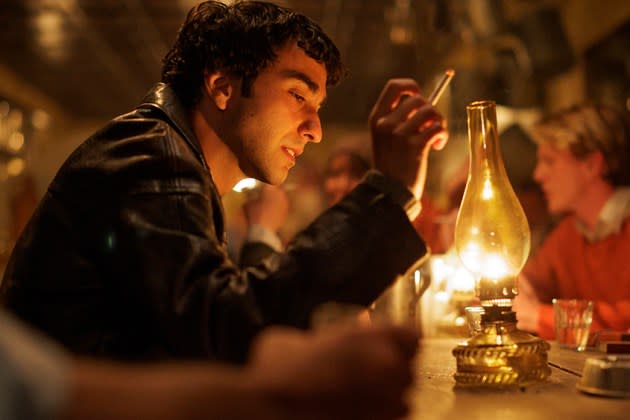‘Oppenheimer’s’ Alex Wolff on ‘So Long, Marianne,’ a Series About How Leonard Cohen ‘Sacrificed Love on the Altars of Fame’

“’I sacrificed my love on the altars of fame,’ Leonard Cohen said in the ‘70s,” “So Long, Marianne” showrunner Øystein Karlsen notes. Cohen was referring of course to his ‘60s decade-long relationship with Norway’s Marianne Ilhen, which shaped him for life.
One of the highest-profile and most anticipated world premieres in Series Mania main competition, “So Long, Marianne” is a coming of age love story which, in a quietly innovative, genre-breaking turn, asks whether the place in the world chosen by one character, Leonard Cohen, was always for his good.
More from Variety
Sold by Cineflix Rights as an eight-part series, “So Long, Marianne” begins in 1959 focusing on Norway’s Marianne Ilhen and Cohen’s love idyll on Hydra, a Greek island, which Ilhen reaches as the partner of budding Norwegian novelist Axel Jensen, and Cohen looking to find a place where, he says in Episode 1, he “can take responsibility for my own identity.”
Starring Alex Wolff (“Oppenheimer,” “A Quiet Place: Day One”) as Leonard Cohen and Thea Sofie Loch Næss (“The Last Kingdom”) as Marianne Ilhen, the series takes in their chance meeting at the door of a taverna – which still exists to this day. As their love deepens, Cohen takes his first steps to become one of the most famous singer-songwriters in the world.
The series ends with Cohen releasing his first two albums which brought that fame, “running for the money and the flesh,” as he put it, on New York’s singer-songwriter scene.
Included in Cohen’s first album, the song “So Long, Marianne” was not originally written as a goodbye: Its first title was “Come On, Marianne” – which may explain why its chorus is an invitation to get together, and “laugh and cry again.” But soon after he recorded it, Ilhen and Cohen split.
“Cohen wanted to travel the world and be a popstar, Adam Cohen, his son, told us,” says Karlsen. “So Long, Marianne” is “a story about what’s important in life,” he adds. “Long before Leonard became a sort of older statesman in his later years, he had success, everything that he had hoped for, but he was probably at his unhappiest.”
He never stopped loving Ilhen. “I’ve always loved you. You know that,” he famously wrote to her in 2016, a scene caught early in the series. Also early on in the series, Cohen is seen on his deathbed a few months later. His life was a search for a higher meaning, a religious belief structuring his world. That could explain, Karlsen suggests, the accusation he makes in “So Long, Marianne,” that she distracted him from this quest: “We forgot to pray for the angels and the angels forgot to pray for us.” “You hung onto me like a crucifix,” he also sings. His belief in Marianne’s love was one act of faith he never seems to have questioned.
“So Long, Marianne” is co-produced by Norway’s Redpoint Productions, Greece’s Tanweer Productions, the UK’s Buccaneer, and Canada’s C3 Media, which is owned by Cineflix Media alongside Cineflix Rights.
“So Long, Marianne” is developed by Ingeborg Klyve (“Exit”), Karlsen and Tony Wood (“Marcella,” “The Burning Girls”) and written for the screen by Karlsen and Jo Nesbø (“Harry Hole,” “Headhunters”) for Norwegian pubcaster NRK and Canada’s Crave, the streaming service of Bell Media.
Karlsen and Bronwen Hughes (Better Call Saul) directed; Ingeborg Klyve and Glenn Lund produced.
Variety talked to star Alex Wolff about playing Leonard Cohen.

The series weighs as a poignant and quietly revolutionary coming of age love story. Normally in coming of age, the hero finds his place in the world, which is beneficial for him. Here, Leonard Cohen finds fame, which he always wanted, but he loses the love of his life. I wonder if you could comment?
I couldn’t phrase it as well as you just did. The show and [showrunner] Oystein Karlsten – who is one of the greatest collaborators I’ve ever had and has become a dear friend – is special. It’s impossible for me to sum up it’s going to be impossible for me to sum up in a few words what it’s meant for me as a person and as an artist going through Leonard’s journey. I like you’re calling it quietly revolutionary because I also think it’s pretty special. All I did was grab on to the racing car and hold on for dear life. My only job was just to trust Øystein and hope to not do too bad.
Øystein tells me you dedicated almost a year and a half of your life to “So Long, Marianne,” had a voice coach to speak like Leonard, another to write like him and another to play the guitar like he did. And you really researched his life.
Yeah, at this point, it’s spooky, you know, the amount of things. When I started talking to Øystein about Leonard’s blood type, I realized, I had to really soft pedal the whole thing….The two of us and Thea Sofie Loch Næss, the wonderful actress playing Marianne and who’s the real star of the show in my opinion, went far, we went deep.
Learning everything that I could about Leonard was the least I could do. Because I already felt that it’s an impossible task to recreate someone who was an original, a landmark of our time. So figuring out what size shoes, who his influences were, reading [Federico García] Lorca and all that, was the least I could do.
He walked into a bookshop in Canada and found a collection of Lorca’s poetry.
The first collection wasn’t translated.
Penguin brought out an elegant translated slim volume in 1965….
I wish I knew that. I brought the 2,000-page Lorca block to Hydra. Everyone made fun of me.I was going around reading this, what looked like something you would use to build a roof.
One thing which marks out the series are its dialogs. They sound, at first occasionally, but increasingly, like something Cohen could have sung, for example when at a drunken dinner, he’s asked if he believes in God and he says: “The devil is just God when he’s drunk.”
I originally said: “Yes, he’s an old friend of mine,” and Øystein took that and made it better. We didn’t want to paint Leonard Cohen as a high priest just a brilliant, young, flawed person.
Yours is also a much funnier Leonard Cohen which you might expect. When he talks to Marianne for the first time, he invites her to a drink in the taverna and says we can find a hockey team to join us or some Members of Parliament.
That was improvised. I’d read “The Favorite Game” and “Beautiful Losers” over and over again and found some really deep interviews from the CBC, and I noticed that he’d resort to quips when talking about himself. I was just rolling with the stream of consciousness, assuming it would be cut in the edit but Øystein is a brave director and left a lot of those things in.
“So Long, Marianne” from its title to credit explanation “based on true stories” makes clear, as Episode 1 quickly bears out, that this is not just Cohen’s story but also Marianne’s.
What Thea did with Marianne is inform a lot of what happens in that story, whether she’s on camera or not. Her performance is so vibrant that you start to feel her creep in through all these scenes, whether she’s in it or not. You think a lot: ‘What does she think about this?’ ‘What does this mean in terms of her interpretation of Leonard?’
She’s been described as Leonard Cohen’s “muse.” Traditionally, in a patriarchal cannon, as pioneering feminist Charmian Clift, another expat on Hydra, tells Marianne Ilhen, that connotes a young woman who inspires with her beauty. Ilhen’s role seems far larger.
I think the show from the get-go lets you know that it’s about two people and that they’re equals. I love the title being “So Long, Marianne” and not being “Leonard.” One person got famous because of the art that they were making became commercially successful. But I’ve never bought into the concept of a “muse” in general. It’s really about two people and their lives and this great, almost Shakespearean revolutionary romance. But it was kind of happenstance how they found each other. What the show is really saying is look at these two rich, complex people and how lucky they are to have this time together, complex as it is.
You’re a professional musician, have been part of a duo, “Nat & Alex Wolff,” as well as a film director (“The Cat and the Moon”). How did you approach playing Leonardo Cohen, which includes singing in character as Leonard Cohen?
I just learned every Leonard song. I was like a jukebox. They could just press, you know, F3, and I’ll play “Bird on a Wire,” and they press a 6 and I’ll play: “Tonight Will be Fine.” I wanted to just be as much of a jukebox for them as, as they needed. I just considered myself like a gumball machine of Leonard songs.
Best of Variety
From 'The Idea of You' to 'Apples Never Fall': The Best Book-to-Screen Adaptations to Read This Year
Sign up for Variety’s Newsletter. For the latest news, follow us on Facebook, Twitter, and Instagram.

 Yahoo Lifestyle
Yahoo Lifestyle 
